By Tourism Sault Ste. Marie
Sault Ste. Marie is the perfect place to visit if you want to enjoy some of the best hiking trail in Ontario. Incredible lookouts, magnificent waterfalls, the rugged Canadian Shield, important historical sites, and clean fresh air with just the sound of the wind in trees or waves on the shoreline… Here are eleven hikes in and around Sault Ste. Marie for you to enjoy.
If you are looking to stay within the city limits then check out these three great trails, perfect for a family hike or if you are looking for a less strenuous trail.
If you are looking for a family-friendly hike in Sault Ste. Marie, then the Hub Trail is perfect for you. The trail as a whole is 22.5km of paved path and wooden boardwalk that circles the city.
You can of course choose the section you want to hike and the Fort Creek section is a popular choice for many. The trail takes hikers over three picturesque bridges, where there are lots of opportunity to enjoy the beautiful scenery of the creek below as well as many opportunities to spot all the interesting creatures that live there. Keep an eye out for hawks, great blue herons, and monarch butterflies.
Visit this Hub Trail page for more information including a link to a complete map!
Choose the Attikamek trail and Whitefish Island trail, part of Batchewana First Nation, for a beautiful and well paced hike within the city limits. Parking and trailhead is located at Sault Ste. Marie Canal National Historic Site and you can access the Island across the locks itself.
Whitefish Island is a National Historic Site for Canada. It’s also a traditional territory and meeting ground of the Anishinaabe peoples of the Great Lakes due to the abundance of natural resources and fish in the St. Mary’s River.
This site is complete with an easy to follow trail system marked with informational plaques explaining the importance and historical relevance of the island. These trails will lead you through nature preserves right to the historic fishery of the St. Marys River Rapids.
The Voyageur Trail is a public hiking trail consisting of almost 600km of wilderness style trails in Northern Ontario. The Hiawatha Loop (which goes past the stunning Crystal Falls), Odena Loop, Beaver Loop and Mabel Lake Loop make up around 20km of trails in this area.
Lots of information is available on the Voyageur Trail Association website here. With maps of the trails at Hiawatha here. In addition all the maps are available via the Ondago App.
These hikes are perfect for a day or half day of hiking and are within one hour’s drive of Sault Ste. Marie.
This there-and-back trail through the beautiful maple forests of the Algoma Highlands takes you to one of best lookout hikes in Ontario. The trail begins at Robertson Cliffs Road and takes you to three incredible south and west facing lookouts. From there you can continue along and do the Robertson Cliffs Loop, passing a beautiful waterfall loop hike, or head back the way you came.
The trails are owned and cared for by Algoma Highlands Conservancy, a not for profit organization that is run by local volunteers. To access maps of the trail system click here.
A 30 minute drive north of Sault Ste. Marie takes you to Harmony Beach, where you hike to a spectacular lookout, Eagle Ridge Lookout, overlooking Lake Superior.
This moderate trail is part of the Voyageur Trail System, and maps are available online or as hard copies. Forest The Canoe run guided tours to the lookout, click here for more info!
Chippewa Falls is a 35-minutes drive north of Sault Ste. Marie, parking and trailhead is right along the Trans Canada Hwy. The falls, which are visible from the highway itself, stand 25 feet high.
The hiking trail offers an easy 2.5km hike to the upper falls, which starts in the parking area and follows the river upstream to the top of the main falls. The path continues alongside the river past the upper falls if you want to explore further.
Chippewa Falls are a stop on the Group of Seven driving tour – the falls and rapids rapids inspired A.Y Jackson’s sketch ‘Stream Bed’. Lookout for a ‘Moments of Algoma’ art easel at the trailhead with more information about the falls and the famous group of artists!
An beautifully scenic drive east of the city through the Sylvan Valley, and just north of Bruce Mines, takes you to the Rock Lake trailhead. The Rock Lake trail is a offshoot from the Voyageur Trail system, and end up at a unique, smooth rock-top that feels like it should be inspiration for a Group of Seven painting.
Theses smooth rocks face north and lookout over Rock Lake, with an array of maple forests beautifully surrounding it.
The Edmund Fitzgerald lookout trail is another trail with a spectacular lookout. This one overlooks Pancake Bay Provincial Park (in which the trail is situated), Lake Superior and even as far as place where the Edmund Fitzgerald ship tragically sunk in 1975.
The trail system has 3 hikes available; 6km, 10.5km and 13.5km, with the latter hikes taking you to waterfalls and the inland Tower Lakes. For further information click here.
If you are looking further afield and want to take in all that the Lake Superior coast has to offer, then consider these beautiful hikes.
At the south end of Lake Superior Provincial Park are the Agawa Rock Pictographs. A clearly marked sign on Highway 17 directs visitors to a parking area at the trail head – map coordinates here.
The Agawa Rock Pictographs is one of the most famous pictograph sites in Canada and is one of the most visited indigenous archaeological sites too. It is a sacred site where generations of Ojibwe have come to record dreams, visions and events. Please respect and preserve the pictographs by not touching the paintings.
For those seeking true adventure, consider this spectacular and rugged coastal trail. It extends from Agawa Bay in the south to Chalfant Cove just north of Warp Bay in the north and will give you a true experience of Lake Superior. Local experts recommend taking 5-6 days because many sections require climbing over rocky headlands and cobble beaches, which can be technically challenging and require a steady pace for safety.
There are various spots for beach camping along the trail; you’ll enjoy incredible coastal scenery during the day and perfectly dark starry skies from your beached-down tent at night.
The Nokomis trail is a 3.8km round-trip lookout hike to overlook Old Woman Bay, in Lake Superior Provincial Park.
The trailhead is across the road from Old Woman Bay Beach parking, and the trail itself takes around 2 hours, with breaks to enjoy the incredible views!
Sault Ste. Marie and the Algoma District have countless hiking trails. Others include Gros Cap, Wishart Park and Odena Lookout, all within the Sault Ste. Marie city limits. The Ojibway Park Nature Trail in Garden River, just to the east of Sault Ste. Marie, is a beautiful ~4km trail that includes a boardwalk out to a lookout area. King Mountain is a great hike and can be reached by continuing your route past Robertson Cliffs. The Orphan Lake trail, in Lake Superior Provincial Park is popular in the summer and fall.
Do you have any other hikes in the area that you particularly enjoy? Tag us in your social media photos #outsideofexpected or our account handles @sault.ste.marie for Instagram and @saulttourism for Facebook. Happy hiking!
By Sault Tourism
From the stunning Lake Superior coast to the rugged mountains of the Canadian Shield, Sault Ste. Marie has easy access to a vast network of hiking trails. Our mixed hardwood and conifer forests provide a vibrant canopy of colour in the summer and fall months, and are starkly beautiful and perfectly quiet in winter.
The Voyageur Trail is a public hiking trail consisting of almost 600km of wilderness style trails in Northern Ontario. The Hiawatha Loop (which goes past the stunning Crystal Falls), Odena Loop, Beaver Loop and Mabel Lake Loop make up around 20km of trails in this area.
Lots of information is available on the Voyageur Trail Association website here. With maps of the trails at Hiawatha here.
This there-and-back trail in the Algoma Highlands takes you past one of best lookout hikes in Ontario, on the way to one of the higher mountains in Ontario. The trail begins at Robertson Cliffs road and takes you to three incredible south and west facing lookouts. From there you head through beautiful maple forests of the Algoma Highlands to King Mountain.
The trails are owned and cared for by Algoma Highlands Conservancy, a not for profit organization that is run by local volunteers. To access maps of the trail system click here.
The Edmund Fitzgerald lookout trail is another trail with a spectacular lookout. This one overlooks Pancake Bay Provincial Park (in which the trail is situated), Lake Superior and even as far as place where the Edmund Fitzgerald ship tragically sunk in 1975.
The trail system has 3 hikes available; 6km, 10.5km and 13.5km, with the latter hikes taking you to waterfalls and the inland Tower Lakes. For further information click here.
For those seeking true adventure, consider this spectacular and rugged coastal trail. It extends from Agawa Bay in the south to Chalfant Cove just north of Warp Bay in the north and will give you a true experience of Lake Superior. Local experts recommend taking 5-6 days because many sections require climbing over rocky headlands and cobble beaches, which can be technically challenging and require a steady pace for safety.
There are various spots for beach camping along the trail; you’ll enjoy incredible coastal scenery during the day and perfectly dark starry skies from your beached down tent at night.
Nestled between the Great Lakes, Sault Ste. Marie has wild rivers, majestic channels, hidden coves, stunning waterfalls and, of course, more freshwater lakes than you could ever count. Here are 4 mouthwatering paddling routes to wet your appetite.
There are a number of entry points to the river including Pine St. Marina, Bondar Marina and the Waterfront Adventure Centre (which has rentals). A paddle west will take you to the historic canal, rapids and International Bridge. East will take you towards Bellevue Park and Topsail Island. Keep an eye out for the formidable Lake Superior ‘Lakers’ who use this waterway daily.
Lake Superior is a huge draw for paddlers, and the Water Trail maps out the 1,000km Canadian route from the Bobbi Bennett Memorial Park in Gros Cap to Lorne Allard Fisherman’s Park in Thunder Bay. Paddling west from Gros Cap’s entry point provides an immediate glimpse of Lake Superior’s rugged shoreline; you’ll see spectacular cliffs, gravel beaches and a vast, open horizon along the 10-km section to Red Rock.
A backcountry paddler’s dream; 70km of winding river from Witchdoctor Lake in the heart of Algoma to Lake Superior’s Goulais Bay just north of Sault Ste. Marie. The full route can take up to 5 days with numerous portages to get past some pretty lively waterfalls. A logging road leads to the Witchdoctor Lake, though there are of course many other entry points. For a half day paddle consider starting at Mountain View Lodge and paddling to Kirby’s Corner in Goulais. This section includes Class I and II rapids, as well as plenty of swift water, making it suitable for novice whitewater paddlers. Paddling in spring or fall is best when water levels are high.
The Jarvis Circle Route is a perfect inland-lake paddling route, and with all the shore-lined maple trees, a great route to paddle in the fall. The full loop is 30km long, with fifteen rugged portages along the way varying from 50 to 750 metres. You start and end at Northland Lake then take a clockwise or anticlockwise route through numerous small lakes including Jarvis, Reserve and Clearwater.
Check out this great video below:
Sault Ste. Marie has world-class mountain biking trails on newly machine-built flow trails as well as challenging cross country climbs over the Canadian Shield. For gravel riders we have flat open gravel roads where you can burn through the kilometres while enjoying picturesque Northern Ontario countryside.
More than 40km, over three unique systems; Crystal, Red Pine and Pinder. A mix of newly machine built trails, and older traditional single-track trails, alongside (and over) beautiful creeks, waterfalls and towering forests. Trails are available for all skill levels, plus there is a new skills park!
Get all the info including trail maps and videos on our Mountain Bike page here.
This 7km out-and-back trail through the stunning Canadian Shield will take you to the beautiful Farmer Lake. Navigate the technically challenging Climb to Canyon section, climbing almost 50 metres, then take on the many berms and hairpin turns of Farmer Lake trail. On the way back advanced riders may want to test their skills on the new Crazy Train trail; an adventurous and aptly named downhill trail which has enough vertical to keep any adrenalin junky interested.
Just east of the city is the relatively flat and fertile Sylvan Valley, with almost endless kilometers of picturesque and winding gravel and backcountry roads. One popular day ride, at around 140km is the Rock Lake loop. The route threads through Sylvan Valley road, south along McCarrel Lake, circles Otter Lake then back north past Rock Lake, before returning to Sault Ste. Marie. Of course, Google maps and the many plan-your-route apps means you can tailor any version of this route to your own tastes.
Sault Ste. Marie has expert guides to help you get the most out of your adventure. Visit our Tours & Guides page for more info.
Needing to get outfitted? We have plenty of stores with the latest and best equipment to help you out. Visit our Outfitters page for more info.
Step aside, Rocky Mountains. Other regions offer ski towns that pack the amenities without the crowds. Look just across the U.S.-Canada border, beyond the northeast end of Michigan’s Upper Peninsula, to Sault Ste. Marie. The adventure capital of Ontario boasts fun resort runs, an accessible ski program, groomed nordic trails, backcountry terrain, and piles of snow (courtesy of the adjacent Great Lakes). Whether you’re traveling from near or far, winter in Sault Ste. Marie has the solitude and powder every skier is chasing—along with excellent accommodations and places to dine. But take it from the residents who know the area best. We asked three local skiers to explain why Sault Ste. Marie is the ideal destination for your upcoming ski vacation.
Ski the Lake Effect
Outside: What’s special about skiing at nearby Searchmont Resort?
Robbie Andison, Canadian Ski Team alum: Searchmont and the backcountry surrounding it is such a special, untouched area of Ontario. The lake-effect snow mixed with the cold winters provide such a great base. And it allows visitors and locals to find some fresh powder whenever they want.
Click here to continue reading…
By Sault Tourism
Sault Ste Marie is a city that DOES winter – we have the snow, the ice, the winter-loving people and we have incredibly beautiful, frozen waterfalls too! Ice climbing is great way to experience winter; it’s physically challenging, it will get your adrenalin going, it’s beautifully awe-inspiring, and it’s a truly unique adventure!
Steve Foster, from Sault Ste. Marie, is a certified, highly experienced, expert ice climber who will help you have the best possible adventure. His company, Steve Foster Adventure Instruction, offers half day experiences for all abilities, to enjoy these beautifully frozen ice structures.
Steve Foster Adventure Instruction will meet you in the morning at one of his scouted and fully verified locations. From there Steve will provide a fully inclusive tour that includes: professional equipment that fits you, warm clothing should you need it, a quick demonstration, and of course expert instruction from over 25 years ice climbing.
Steve’s tour last around 4 hours and he can work with your specific timing needs. The costs of a tour are $150 a person and includes use of all equipment as well some snacks and a hot chocolate.
You should bring warm clothing, including several layers for extra warmth, though Steve will communicate all the specifics in an email to you after booking a tour!
Whether you are a first-time ice climber or a seasoned veteran, you will have a blast! Depending on the location Steve Foster can provide several different ascent options depending on skill level or just personal preference.
Ice climbing is a truly unique adventure. Come and experience it for yourself!
Visit the Facebook page Steve Foster Adventure Instruction, or email sfadventureinstruction@gmail.com for more info or to book a tour.
By Diana Lee @only1phoenixx
Many of us that enjoy spending time in nature love learning more about the spaces we play in. Whether it’s learning about new paddling spots to launch from or about the wildlife we’ll see along the way, we outdoor enthusiasts typically want to get more out of our adventures!
When you go on an Indigenous-guided tour, be prepared to see, explore, and appreciate the lands and waters we play in from a different lens by recognizing and supporting Indigenous People’s deep connections with these spaces.
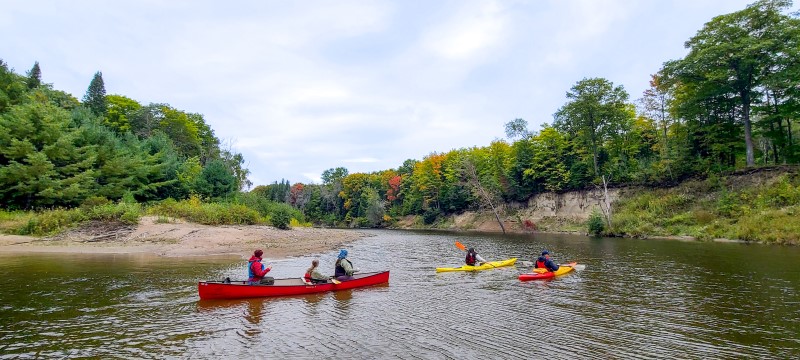
On a recent trip to Sault Ste. Marie in Algoma Country, home of the Anishinaabe since time immemorial, I spent some time with Thrive Tours, an Indigenous-owned and operated guided ecotourism company, and the experience went above and beyond a paddling tour.
As a non-Indigenous person, I’m always excited to learn more about our amazing province, country, and world. I’ve been lucky enough to join in on a few Indigenous travel adventures from Inuvik, Northwest Territories, to Puvirnituq, Quebec, and I’m happy to share a few highlights from my paddling trip and why you should plan your next adventure with an Indigenous-led tourism operator.
Whether you’re visiting Sault Ste. Marie (traditionally known as Baawaating), or a local, it’s always fun discovering new paddling spots in and around the city. As a stand-up paddleboarding (SUP) aficionado, I bring my paddleboard on all my road trips and travels. I was excited to learn I could BYO (bring your own) SUP for this Thrive Tours paddling adventure!
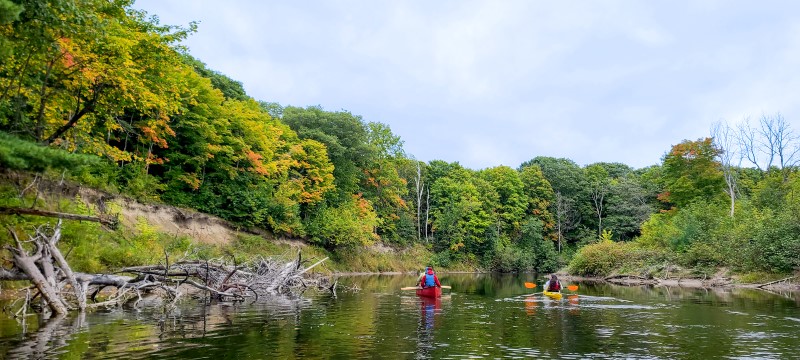
Our first stop was at Thrive Tours’ home base in the Soo, where I met the owners and operators, Amanda (Biimskoonkwaat) and Brad (Ozhaawashkwaa Animikii). Together, they adventure all year round, offering guided canoe, kayak, hiking, and snowshoeing while promoting and maintaining local Indigenous practices and philosophies.
After chatting about what we felt like doing – canoeing, kayaking, or stand-up paddleboarding (SUP), we packed up everything (yes, everything, haha!) We headed to Garden River, located in Garden River First Nation. I learned that this is a sacred area, and a guided tour is a great way to experience this waterway.
Before launching our boats and board, we began by offering Tobacco to the water, a sacred way to connect with all living things. Brad shared the importance of Semah, the Anishinaabemowin word for Tobacco, “when we place Tobacco in our left hand, it symbolizes the closeness of that medicine to our heart. When we transfer those good thoughts and meaningful intentions into the Semah and place it in the water, we connect with all our ancestors and creation itself.”
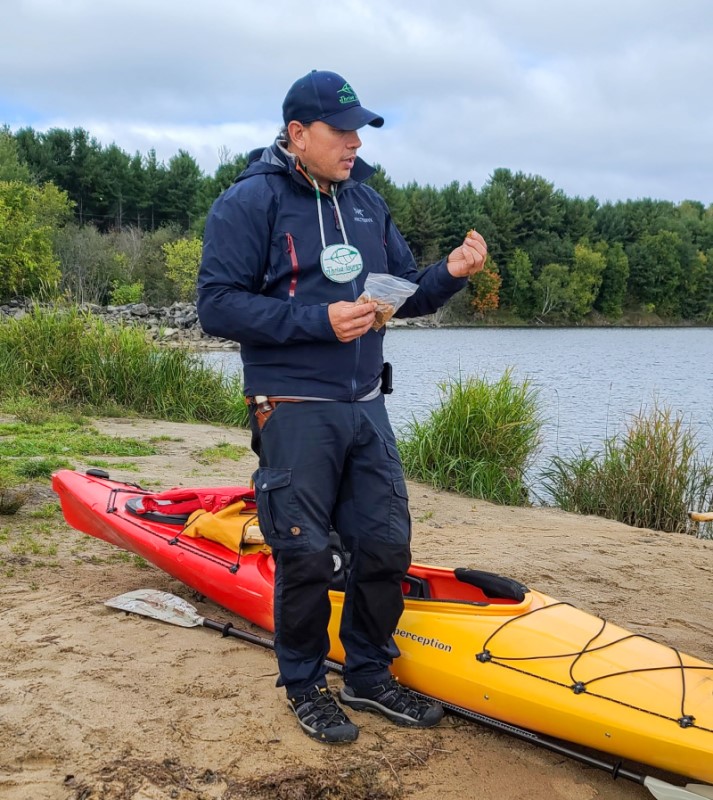
Seeing wildlife always sparks joy and the Thrive Tours team combined the sightings with Anishinaabe teachings right on the water. Seeing eagles, migizi in Anishinaabemowin, swooping down from the trees in front of us was incredibly special. Eagles also symbolize love, or zaagi’idiwin, as part of the 7 Grandfather teachings.
As we continued to paddle, the occasional splash of salmons jumping out of the water kept me excited about what we would see (and learn about) around the next bend of the meandering river.
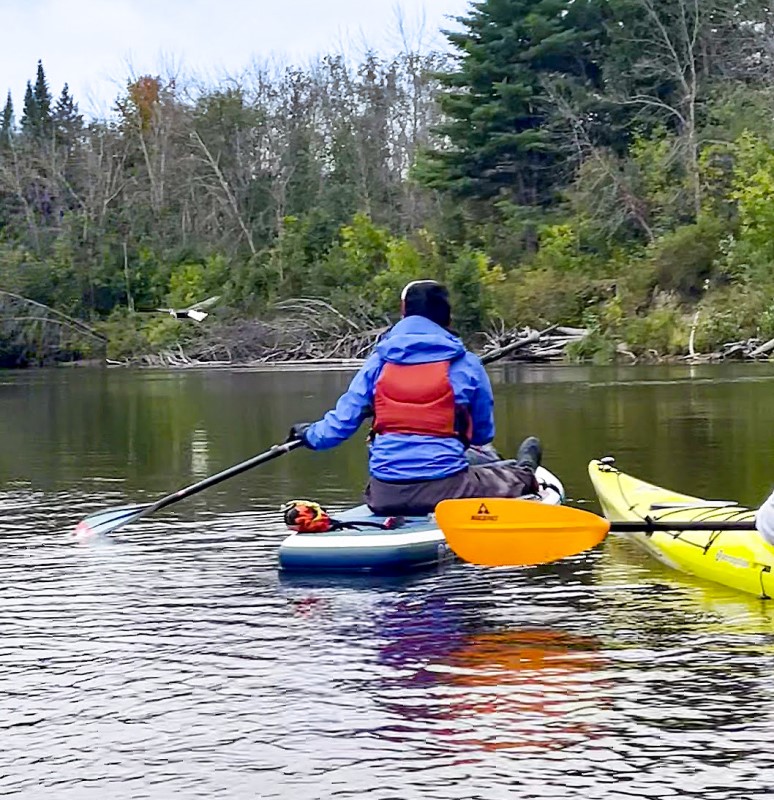
When it was time to take a break, we enjoyed warming up by a mini campfire, with snacks and great conversations while sipping warm Cedar Tea.
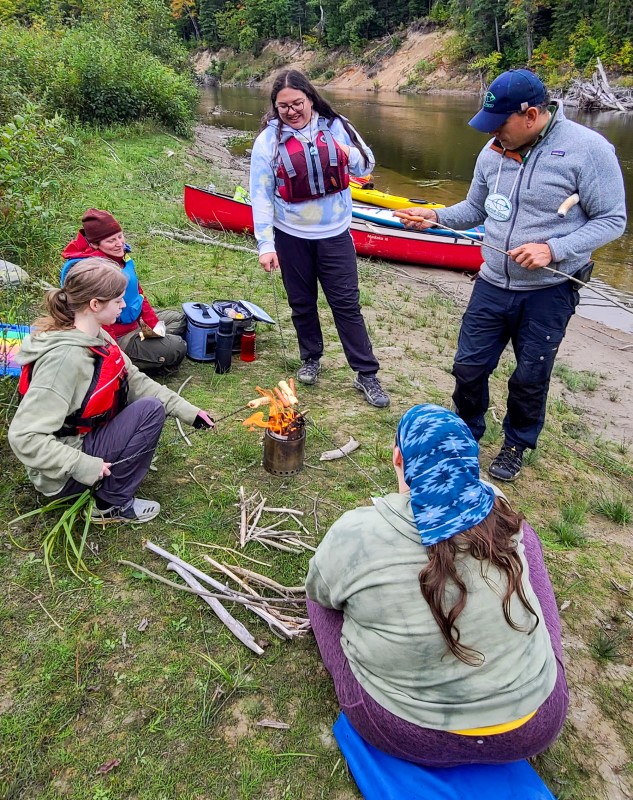
During this tour, I got to chat with Lucia Laford, a local Indigenous artist, educator and one of the Thrive Tour guides. Lucia leads a Paddle & Paint Woodland-style painting workshop where participants can create their own nature-inspired painting while out in nature! Lucia also teaches Anishinaabe Art and Material Practices at Algoma University.
“Woodland style is about visualizing the connection and relationships between people, animals, spirits, and nature. I paint my way of life, the Anishinaabe way, which includes ceremony and spirituality, but also my connection to the land and the plant, tree, and animal nations. In this way, my work is completely inspired by nature and the love and respect I feel towards Aki (the earth), Nibi (the water) and all things in creation.
The Paint & Paddle workshop is about connecting with yourself on the water and the land. Woodland art helps deepen that connection by exploring the relationships and personal kinship we have to life around us. We [Thrive Tours] helps facilitate the joy of being on the land and water, and we do so in a safe, respectful, and sustainable way. When paddling, we talk about the concepts in Woodland-style art while sharing Indigenous perspectives and teachings. Paddling and being able to touch the water and land that we are talking about serves as an incredible inspiration when painting!”
– Lucia Laford, Thrive Tour Guide, Woodland style painter and Indigenous Arts educator
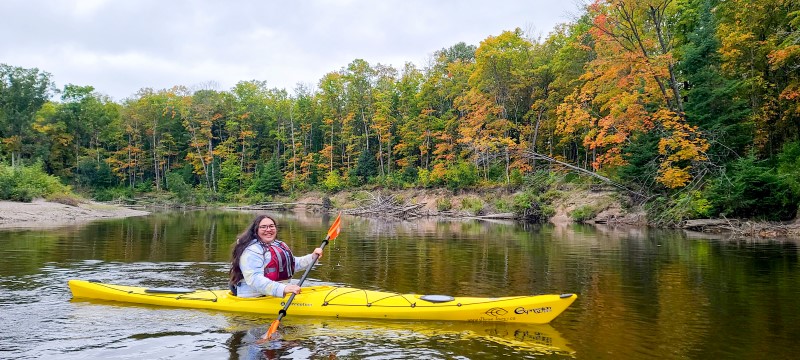
For many Indigenous People, music was a way of storing ecological, ancestral, and traditional knowledge and teachings. Passing along that knowledge was often done through stories and songs.
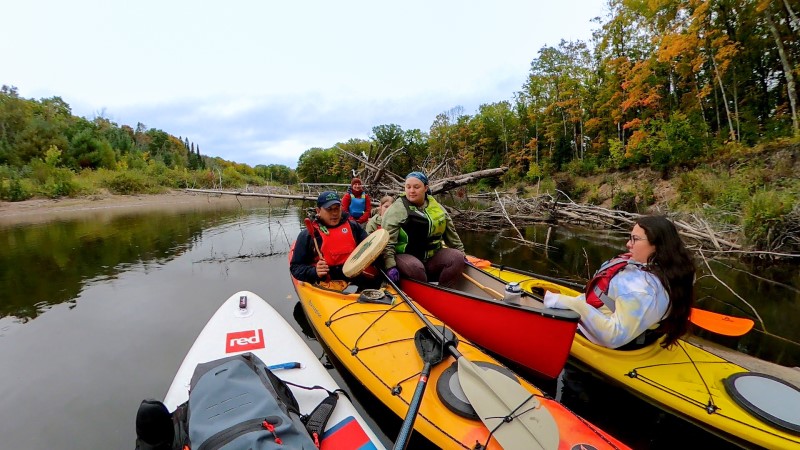
The gentle current carried us along the river while Amanda and Brad, a powwow singer and member of the Black Bull Moose Singers, shared a few honour songs for women and all of creation. Lucia also shared a Water Song*. The lyrics and varied tempo beautifully represent and honour water – from fast-moving rapids to the steady slow flow of a river, like the Garden River we were floating along. We were all invited to sing along and celebrate being on the water.
While I had no expectations for the tour and was open to going with the flow of Thrive Tours, the way we concluded our paddling adventure was incredibly moving. When I asked if they do this for every tour, Amanda explained, “while every experience [with Thrive Tours] unfolds uniquely, we consistently incorporate physical, emotional, mental, and spiritual aspects. Every adventure includes cultural teachings, Indigenous food sharing, nature-based activities, and First Nations ceremonies.”
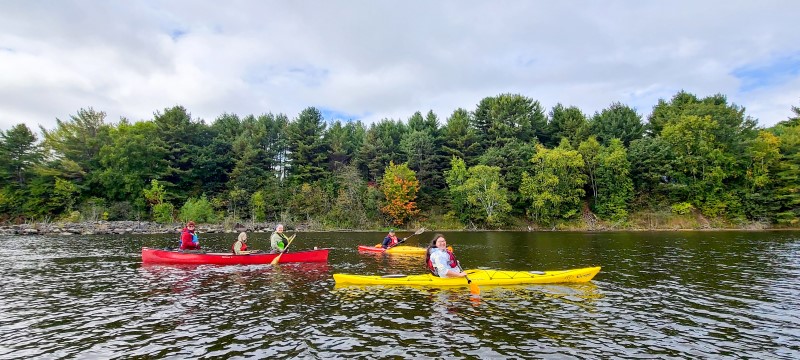
Authentic Indigenous-led travel experiences can help share the stories, histories, and perspectives we don’t get to hear more often. What we can do as allies is to help support that by taking these tours and being open to learning. These excursions that combine outdoor recreation with learning education alongside an Indigenous guide lead to more consideration, respectful, responsible, and meaningful future adventures, whether we travel solo or with company. Travel experiences like this are a step towards taking us beyond land acknowledgements through active participation and ongoing learning, all while adventuring in the spirit and continuous practice of reconciliation.
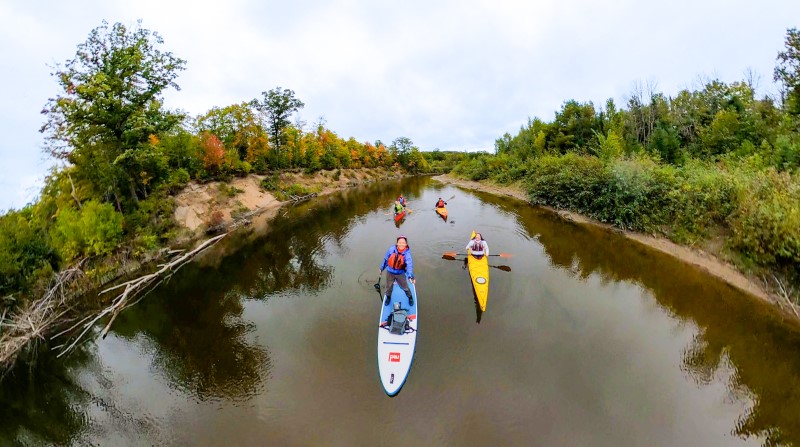
Thank you, Amanda, Brad, and Lucia, for the unforgettable time in Sault Ste. Marie. I look forward to seeing you again soon (hopefully in winter, my favourite season!)
Thrive Tours
https://www.thrivetours.ca/about
For more Indigenous-owned or led travel and adventure ideas:
Recommended resources and further reading:
Diana Lee lives for adventure, the great outdoors, and stand-up paddleboarding (SUP)! She is a certified ISA SUP Instructor, a librarian, and a reporter for Get Out There Magazine. Find out what she’SUP to @only1phoenixx on Instagram and Twitter.
By Conor Mihell
The history of nordic skiing in Sault Ste. Marie is long, colourful and defined by a profound sense of community. More than half a century ago, winter enthusiasts from the upstart Soo Finnish Ski Club blazed their own cross-country ski trails through the snowy woods and rugged hills of what’s now known as the Hiawatha Highlands, located just north of the city centre. Early skiers didn’t know the pleasure of machine-groomed trails. Frontrunners in the club’s recreational races not only set the pace, they also had the challenge of making tracks through the soft powder while keeping ahead of pursuing skiers. Such legendary beginnings kindled one of Ontario’s most vibrant cross-country ski scenes and blazed the way for the development of some of the province’s finest networks of trails.
Fast-forward to 2022, and local event organizer Lawrence Foster was looking to celebrate Sault Ste. Marie’s snowy winters and exceptional skiing terrain. He conceived the inaugural Beaver Freezer Marathon as a fun and adventurous recreational race to wrap up the season at the Hiawatha Highlands. Multiple race options catered to all levels of skiers, fat-bikers and trail-runners, including families, beginners and elite athletes alike, with distances of up to 42 km. Scheduled for mid-March, the event would link existing Hiawatha Highlands nordic ski and fat-bike trails with frozen lakes and wetlands, showcasing the rugged, snow-covered landscape. All proceeds from the volunteer-run event would go towards supporting future trail development to support Sault Ste. Marie’s ongoing efforts to become a hub of outdoor recreation.
“We wanted to make it fun and inclusive,” says Foster, a Sault College professor and former world-class adventure racer. “We had team options. You could race it as a relay or do it as a group. Your kid could ride or ski beside you in the relay. We wanted to have a community event with a friendly vibe, all supporting a good cause.”
First-year registrations far exceeded Foster’s expectations. Upwards of 300 competitors signed up for the event, the majority locals but also approximately 40 registrants from Sudbury, Toronto, Ottawa and Michigan. “It seemed like a great way to ski in places you wouldn’t get to experience otherwise,” says participant Paul Kyostia. “I was looking forward to skiing across the lakes with the benefit of packed trails in between.”
With Foster in charge of mapping a course, participants were sure to get a premium slice of Algoma backcountry. Starting and finishing at the Hiawatha Highlands headquarters at Kinsmen Park, the Beaver Freezer route wound through nearly a dozen frozen lakes and waterways, including Trout and Lower Island and Finn, just north of city limits. Groomers marked and packed the trails for easy skiing, cycling and running. Sault College was the inaugural event’s title sponsor and the college’s Natural Environment students volunteered to assist with race day details, including safety checkpoints and aid stations.
With abundant snowfall throughout the winter and perfect lake ice, the plan seemed bulletproof until a deluge of freezing rain forced Foster to postpone the Sunday race until the following weekend. Foster was deflated, but at the same time he knew that so many dedicated enthusiasts would do far more than salvage the event. Participants and volunteers shuffled their plans and held onto their enthusiasm, and with improved weather conditions Foster says the rescheduled race day was all he ever hoped for. “Countless people lined up to volunteer to make it a great event,” he notes. “I’ve received so many messages of support from people looking forward to next year’s Beaver Freezer. It feels good to be contributing to the momentum of trail development with the Kinsmen Club, the Sault Cycling Club, and Tourism Sault Ste. Marie.”
Foster admits that the weather always remains a wild card for late-winter events, but he’s hoping that scheduling the 2023 Beaver Freezer Marathon across an entire weekend will provide an adequate buffer for any surprises. “The biggest highlight has been the support of the community,” Foster says. But given the area’s deep and passionate roots for nordic sports, local support is a given. As word gets out, Foster anticipates a larger contingent of out-of-towners—with visitors arriving to experience the great trails and welcoming vibe of yet another shining example of why Sault Ste. Marie has always been Ontario’s winter sports capital.
The 2023 event will take place on Saturday, March 11th, with Sunday, March 12th being the backup day. All the information you’ll need including course details, timing and other info is available on the Beaver Freezer website.
Out of town guests will receive 10% off their stay at The Water Tower Inn. Details here.
By Sault Tourism
Sault Ste. Marie is a true winter paradise with so many outdoor activities to choose from. We have one of the highest vertical downhill ski hills in Ontario, over 150km of incredible cross-country Skiing, an abundance of stunning snowshoe trails… Plus we have beautiful woodland skating trails, a new snowmobiling day loop, groomed fat biking trails and Sault Ste. Marie has some iconic, and awe-inspiring ice caves. This winter visit Sault Ste. Marie for your true winter experience.
Getting to Sault Ste. Marie is easy too with several flights a day from Toronto, Sudbury and Thunder Bay and rental cars waiting at the airport. And course you can drive on the Trans-Canada highway, which is well maintained over the winter months.
Big vertical, rugged terrain, Searchmont Resort has some of the best downhill skiing in Ontario. And… new snowmaking equipment means a planned November 23rd opening day – potentially the earliest in the region!
On top of the 703 feet of vertical, 26 runs, 100 acres of rolling mountain, terrain park, 4 lifts, snow school, Searchmont is also a fully equipped resort with a restaurant, bar, shop, ski and snowboard rentals and accommodations. Escape the crowds and the lift queues of jam-packed southern Ontario ski hills and get away to this stunning, adventure-packed mountain.
If you like your vertical off the beaten track, check out the incredible backcountry skiing at Bellevue Valley Lodge.
Sault Ste. Marie offers some of the best cross country skiing in North America. Stokely Creek Lodge has 100km of trails, groomed for both classic and skate skiing and spread over 12,000 spectacular acres of the Algoma Highlands.
Breathtaking scenery including frozen lakes and waterfalls, endless forests, and amazing vistas like the one at the top of King Mountain, make Stokely a bucket-list destination for nordic skiers. Enjoy Scandinavian lodging and stay warm in one of the six warming huts along the way; it’s an experience that will bring you back year after year.
Situated just 10 minutes from downtown, Hiawatha Highlands offers more than 50km of beautiful skiing in towering Pine forests. Click here for a link to all trail and maps or read more about all that Hiawatha Highlands has to offer! Top-tip: enjoy a nighttime lantern ski, which happens a few times a season!
The Bon Soo winter carnival is back for its 61st edition! Join from February 2nd to 10th for this iconic Sault Ste. Marie event!
All the details are on the Bon Soo website. Look out for: Bum Slides, Brett Kissel, Polar Rush, Polar Bear Dip and so much more!
You can also read our breakdown of the event here via our Bon Soo 2024 Travel Inspiration page.
Steve Foster, from Sault Ste. Marie, is a certified, highly experienced, expert ice climber who will help you have the best possible adventure. His company, Steve Foster Adventure Instruction, offers half day experiences for all abilities, to enjoy these beautifully frozen ice structures.
Sometimes you just need a break from the snow and cold. Well, have you ever tried axe throwing? Check out one of our newest and most fun indoor activities!
Missing golf and still need a fix? The Up and Down Lounge has state of the art golf simulators, which can be booked by the hour. You can also grab a drink and some food to be able to make an evening of this fun winter activity!
Sault Ste. Marie has a new day loop for riders! The Soo Highlands Loop starts in the city and goes north to Searchmont and the surrounding area. Sledders can explore the natural beauty of Algoma Highlands, and its rugged landscapes just north of Sault Ste. Marie, in this 169 km loop.
For inspiration watch Cristy Lee enjoy her recent sledding experience in the Soo here!
Sault Ste. Marie is on its way to becoming an epicentre for Fat Biking, one of the fastest growing winter sports.
The Soo has perfectly groomed trails to the north of the city at Hiawatha Highlands and Crimson Ridge. Enjoy some challenging elevation in the beautiful Hiawatha forests as well as the picturesque trails at Crimson Ridge.
Downtown, the Sault Ste. Marie Canal National Historic Site has easy fatbike trails for use on St. Marys and Whitefish islands, adjacent to the St. Marys Rapids. In addition, the St. Kateri Outdoor Learning Centre has around 3.5 km of fat biking trails.
Sault Ste. Marie has a number of some skating rinks and trails, all within a walk or drive of downtown. Check out our new downtown plaza and it’s brand new skating rink!
The City also maintains five over outdoor rinks including the popular waterfront Clergue trail (pictured).
Snowshoeing is one of the best ways to experience winter in Sault Ste. Marie. We have well-marked and beautifully scenic trails all over the city, including at Hiawatha, Crimson Ridge and Stokely Creek.
We also have some expert tour guides who can not only show you the way, but can also provide information about the area and its cultural significance… you may even be treated to a cup of hot chocolate 😉
Check out our Tours & Guide page for all the info!
After a day in the snow and ice you’ll want to refuel and recharge, and we have some great restaurants serving some fantastic food to warm you right up!
From Syrian Shawarma to spicy Indian, delicious Italian or sizzling steak, the Sault has so many great restaurants.
By Virginia Marshall
Where Fort Creek enters the St. Marys River just below the historic locks at Sault Ste. Marie Canal National Historic Site, it’s a shallow channel scarcely broad enough to turn a canoe around. Bridged by boulevards and hemmed by sidewalks and parking lots, the creek disappears altogether for much of its course, buried and nearly forgotten beneath the city above.
On a warm spring evening, I witness a very different Fort Creek, winding through a verdant wetland filled with the sunset songs of veery, Swainson’s thrush and ovenbirds. A contented beaver navigates the meanders, watchful Canada Geese periscope from grassy banks. Perched above downtown, Fort Creek Conservation Area is a remarkable green space within the city.
The way Lake Superior Watershed Conservancy Executive Director, Joanie McGuffin, explains it, Fort Creek is both a living waterway and an allegory for the unseen connections that bind past to present, and culture to ecology.
Revealing hidden connections—between rivers, lakes, watersheds, communities, cultures, people and the planet—is the focus of a new visitor experience developed by the Lake Superior Watershed Conservancy in partnership with the Huron-Superior Regional Metis Community.
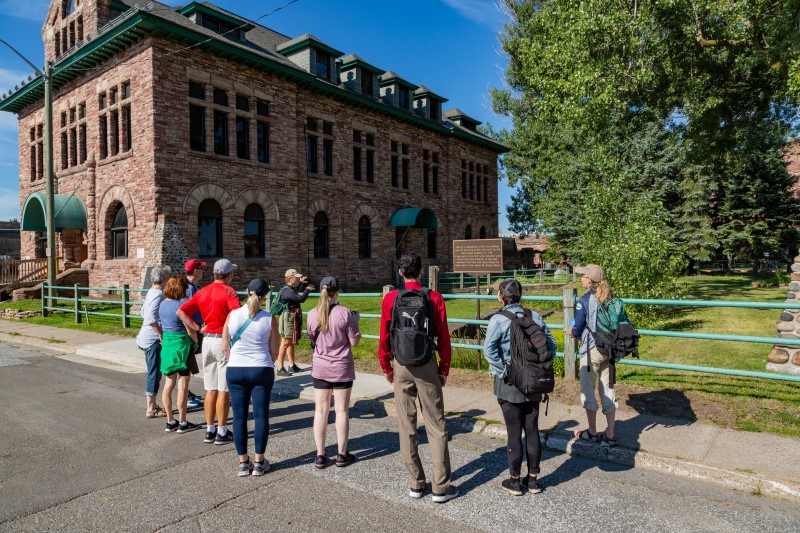
These interpretive tours provide visitors to Sault Ste. Marie with an exciting new way to discover the city, while making meaningful connections to the Soo’s vibrant Indigenous culture and heritage. Historic images, maps and hands-on materials add texture and context, transforming a modern cityscape into an historic gathering place, and an industrialized urban waterfront into a richly interconnected ecosystem.
For generations, the land that is now downtown Sault Ste. Marie was home to a thriving Métis community. The community was organized into river-lots that gave each family access to the river for travel, harvesting and economic activity. Families kept their animals communally in the area behind their homes and harvested maple sugar in spring along the escarpment. In the mid 1850s, Métis families were displaced from their lands, breaking promises by the Crown agent that their lands would be protected. Despite this injustice, the community continues to call Sault Ste. Marie home.
By sharing Métis perspectives on reciprocity and sustainable practices, the interpretive tours also advance the Lake Superior Watershed Conservancy’s work to promote watershed awareness and greater environmental understanding.
“The Métis story inextricably connects culture with ecology,” says McGuffin. “Indigenous people have been able to live with the land and care for our water for thousands of years, because it’s been a reciprocal relationship.”
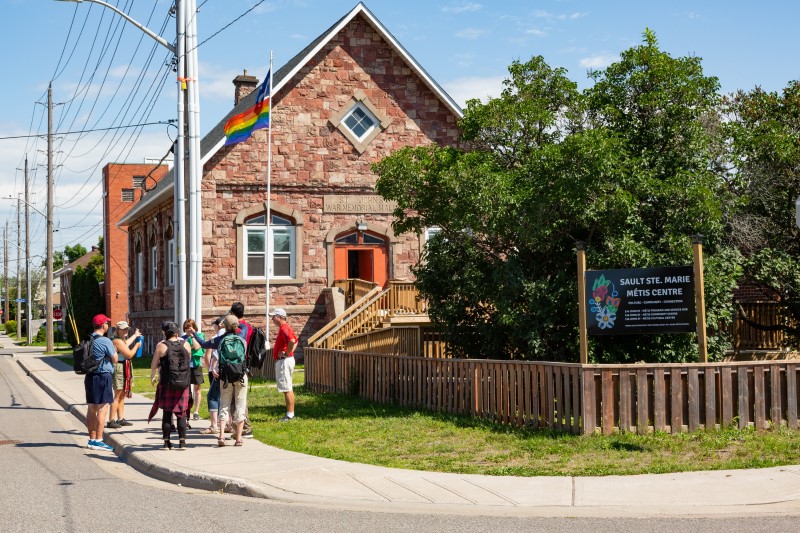
Tour participants can choose to join a Walking Tour or get on the water with a Walking & Paddling Tour. Both tours travel to the city’s scenic waterfront from the Sault Ste. Marie Métis Cultural Centre—a first of its kind in Ontario. Tours last two hours and are led by a Métis interpretive guide, giving visitors a fascinating glimpse into traditional and contemporary Métis life.
Paddling Tour participants board a Big Canoe—a replica of the 36-foot birch-bark canoes that once freighted furs and trade goods between Montreal and Lake Superior—to learn how the St. Marys River is central to both the story of Sault Ste. Marie, and the Indigenous communities who live here.
McGuffin believes passionately in the power of the Big Canoe to bring people together to share ideas and cultural understanding. In 2019, the Conservancy founded a new program called Canoes for Conservation, and she points to the Big Canoe’s stability, inclusivity and accessibility for non-paddlers and multi-generational groups of all ages.
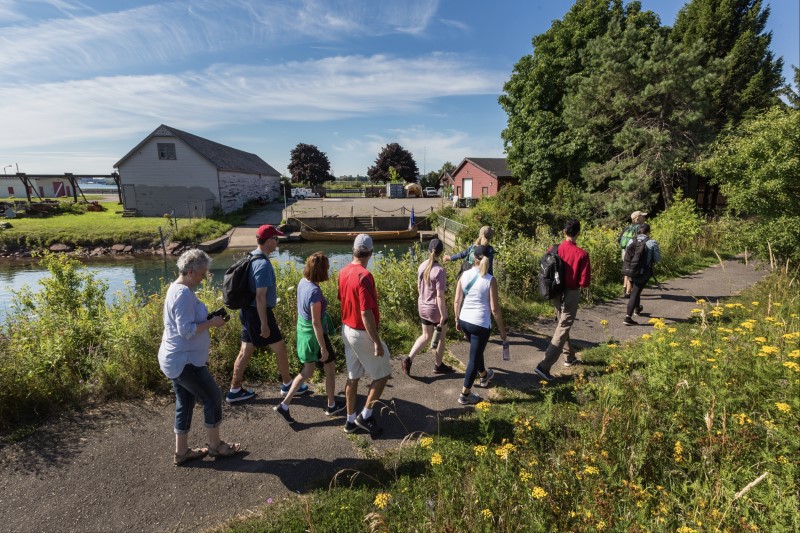
A highlight of the hour-long canoe portion of the journey is “locking through” the historic Sault Canal. Paddlers then venture onto the mighty St. Marys River—comparable in size and power to the Niagara River—feeling the spray of the rapids and the tug of the current beneath their hull. “It’s very tactile,” says McGuffin, “you have a paddle in your hands, you’re able to feel the water, listen to the water. It’s incredible how far into the rapids you can go—people are amazed by the experience.”
For the Métis Nation of Ontario, the tours are “an outstanding opportunity to grow Indigenous tourism in the north and advance reconciliation,” says community leader, historian and MNO Huron-Superior Regional Councillor, Mitch Case.
“In order to have that reconciliation conversation, Canadians need to understand who we are and what matters to us as a community,” he continues. By connecting across cultures, “we are protecting and preserving our unique heritage and world view.”
Lauren Towell is one of five young Métis community members who joined the interpretive guide team this summer. “The connections I share with the water resonate profoundly with the very fabric of my Métis heritage,” she says. “I take great pride in the task of sharing our story, ensuring that it endures for generations to come.”
Walking tour guide, Jake Chalmers, agrees, “Caring for our forests and wildlife is integral to caring for our Métis culture. Being a tour guide helps me to celebrate and share knowledge about both.”
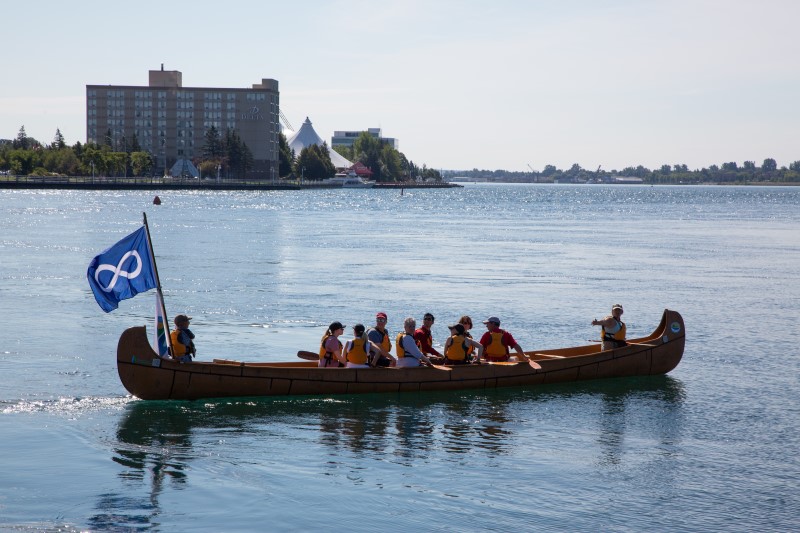
The tours visit numerous sites of great importance to the Métis community. In just a couple short hours, participants come to understand how connection to the river and love for their ancestors empowers the Métis community here—and what it can teach all of us.
For those visiting the city for the first time, the interpretive tours are also a great way to discover the Soo’s top scenic and cultural attractions.
As we stroll towards the river and the leafy promenades of Parks Canada’s Sault Ste. Marie Canal National Historic Site, McGuffin and I pass the Agawa Canyon Tour Train Station and Algoma Conservatory of Music. Housed in a refurbished, century-old sandstone building of the former St. Marys Paper Mill, The Loft is reported to have acoustics rivaling Massey Hall.
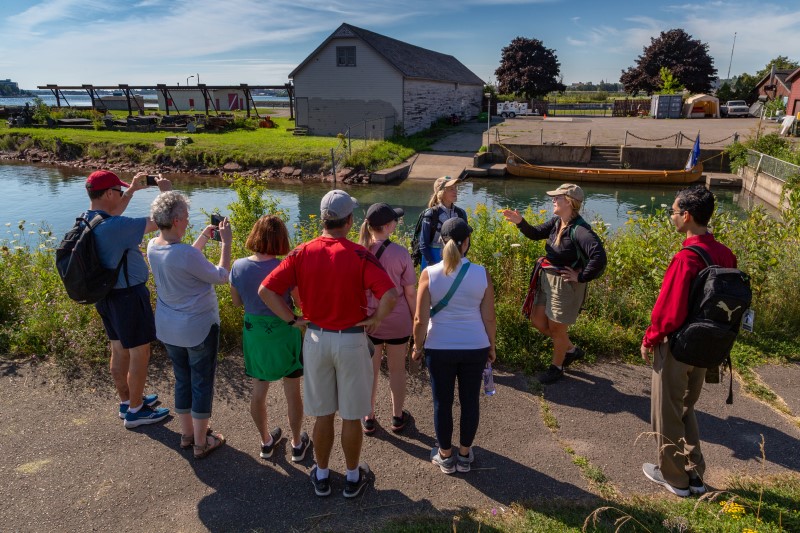
Outside, we see a re-creation of the rudimentary locks the voyageurs used to shuttle their Big Canoes around the Whitefish Rapids. Nearby, the weekly Mill Market hosts local food vendors and artisans where a Hudson’s Bay Company Post once stood.
As we walk, McGuffin tells me about the hidden river, where Fort Creek flows unseen beneath the city. She relates how downtown Sault Ste. Marie, from Bay Street to the river, is built entirely on reclaimed shoreline. “It’s not just about what we can see, it’s also what we can’t see,” she says. “When we don’t look at where water comes from and where it goes, we feel no responsibility for what happens along its journey.”
Before returning to the Métis Cultural Centre, we pause at the mouth of Fort Creek, marveling at the resilience and tenacity of water. The story of a people can be like a river that way—sometimes unseen, but always flowing steady and strong.
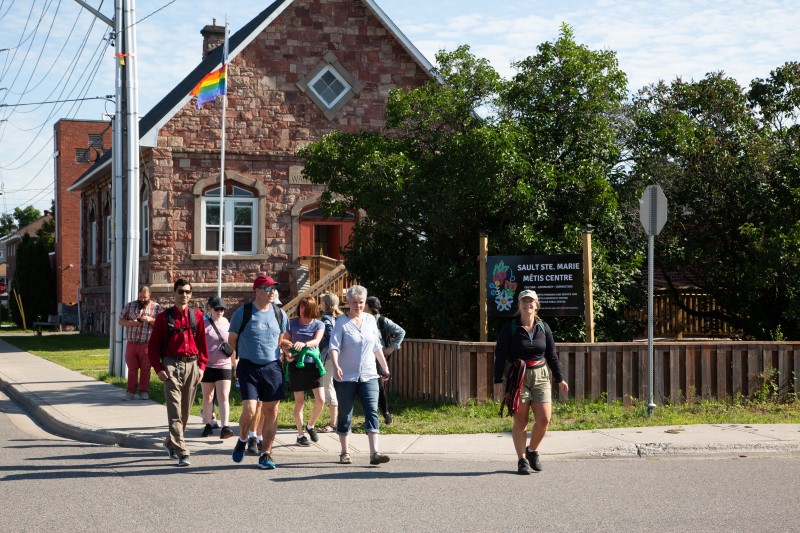
Guided Walking
Friday and Saturday mornings at 10:30 a.m.
Available late June–late September
Tours are 2 hours/5 km in duration
Cost is $50/adult or $25/student, group rate (max. 10 people) $350
Guided Walking & Paddling Tour
Thursday, Friday and Saturday evenings at 5 p.m.
Available late June–late September
Tours are 2 hours/7 km in duration
Cost is $90/adult or $45/student, group rate (max. 12 people) $675
All paddling safety equipment is included
Online Reservations
Individual and group reservations available. Learn more and book your tour now at Métis Tours.
Celebrate the 20th anniversary of the Supreme Court decision acknowledging the Metis Nation as a distinct Indigenous culture in Canada with a visit to the newly opened Métis Cultural Centre at 136 John Street.
By Tourism Sault Ste. Marie
Forest The Canoe are offering a variety of guided tours to see some of the best fall colours in Ontario. The True North Adventure Bus has full day, morning and evening guided tours running in September and October.
Witness the stunning fall colours you’ve seen on Instagram. Paddle beautiful inland lakes. Hike up the iconic Robertson Cliffs to witness a stunning vista of autumn colours that stretch as far as Lake Superior.
Contact experienced tour guides Forest The Canoe to see some of the most beautiful fall colours in Ontario. Ride the True North Adventure Bus this fall, with daily tours departing from Sault Ste. Marie.
Four fall colour tours are offered on the True North Adventure Bus, each a truly unique adventure, and a each chance to see and explore a different part of Northern Ontario. Tours last a full day, a morning or an evening with pick ups from local hotels in Sault Ste. Marie throughout the day.
Friends of Fall Colours
Explore the autumn colour change by water and land. Tours run 9.30am – 6.30pm.
Sunday, Sept 18th,
Friday, Sept 23rd,
Saturday, Sept 24th,
Sunday, Sept 25th,
Saturday, Oct 1st,
Sunday, Oct 2nd,
Wednesday, Oct 5th,
Friday, Oct 7th,
Friends of Fall Colours: Lite Edition
A micro version of Friends of Fall Colours. Tours run 4.30pm – 9.30pm
Wednesday, Sept 21st
Monday, Oct 3rd
Chase The Train
Chase the train all the way to Searchmont, then explore a beautiful waterfall on the Goulais River. Tours run 8am – 12.30pm.
Thursday, Sept 22nd
Monday, Oct 3rd
Tuesday, Oct 4th
Thursday, Oct 6th
Coastal Fall Colours at Sunset
Experience breathtaking views of Algoma Highlands along the greatest lake all the way to Montreal River. Tours run 5pm – 9.30pm
Thursday, Sept 22nd,
Monday, Sept 26th, Thursday, Sept 29th
Tuesday, Oct 4th,
Thursday, Oct 6th,
Sit back and enjoy the drive, that’s all you’ll have to do with the True North Adventure Bus. Expert, certified tour guides Ryan and Shana provide informative narration to help you get the most of your experience. Enjoy your day with all the quality equipment and safety information you will need.
By Sault Tourism
Sault Ste. Marie has just experienced a fantastic winter with plenty of snow meaning our ski hills and trails will be open well into April!
So come and enjoy Searchmont Resort, one of the biggest vertical downhill ski hills in Ontario, all the way through Easter! Or cross-country ski over 150km of incredible cross-country Skiing at Hiawatha Highlands and Stokely Creek Lodge. Visit on April 1st or 2nd and enjoy Hogan’s Homestead’s Maple Syrup Weekend! Or, weather and ice cover permitting, enjoy a one of a kind experience with an ice caves tour with Forest The Canoe.
Keep reading to help plan your Spring skiing and other things adventure!
Big vertical, rugged terrain, Searchmont Resort has some of the best downhill skiing in Ontario. And… new snowmaking equipment means more snow and staying open later in the year.
On top of the 703 feet of vertical, 26 runs, 100 acres of rolling mountain, terrain park, 4 lifts, snow school, Searchmont is also a fully equipped resort with a restaurant, bar, shop, ski and snowboard rentals and accommodations. Escape the crowds and the lift queues of jam-packed southern Ontario ski hills and get away to this stunning, adventure-packed mountain.
Sault Ste. Marie offers some of the best cross country skiing in North America. Stokely Creek Lodge has 100km of trails, groomed for both classic and skate skiing and spread over 12,000 spectacular acres of the Algoma Highlands.
Breathtaking scenery including frozen lakes and waterfalls, endless forests, and amazing vistas like the one at the top of King Mountain, make Stokely a bucket-list destination for nordic skiers. Enjoy Scandinavian lodging and stay warm in one of the six warming huts along the way; it’s an experience that will bring you back year after year.
Situated just 10 minutes from downtown, Hiawatha Highlands offers more than 50km of beautiful skiing in towering Pine forests. Click here for a link to all trail and maps or read more about all that Hiawatha Highlands has to offer!
On the weekend of April 1st and 2nd, Hogan’s Homestead, one of Ontario’s best maple syrup producers, hosts a Maple Weekend. The ‘Everything Maple Festival’ includes a local market, operational tours, food + drinks and maple activities. Stay tuned and visit their website here as more details become available!
Lake Superior’s phenomenal ice caves are a sight to behold. Enigmatic, unpredictable, subject to nature’s whims, but wholly worth it, these incredible structures will leave you speechless. They form in mid-winter when wavy conditions followed by a deep-freeze sculpts the rugged Lake Superior coastline into caves and chasms of blue ice.
Weather and ice-cover permitting, Forest The Canoe offers guided day trips to the best ice caves, including crampon-equipped snowshoes and a snack. We do recommend you use a local guide with experience of the conditions as walking on ice can be dangerous.
Steve Foster, from Sault Ste. Marie, is a certified, highly experienced, expert ice climber who will help you have the best possible adventure. His company, Steve Foster Adventure Instruction, offers half day experiences for all abilities, to enjoy these beautifully frozen ice structures.
Sault Ste. Marie has a new day loop for riders! The Soo Highlands Loop starts in the city and goes north to Searchmont and the surrounding area. Sledders can explore the natural beauty of Algoma Highlands, and its rugged landscapes just north of Sault Ste. Marie, in this 169 km loop.
For inspiration watch Cristy Lee enjoy her recent sledding experience in the Soo here!
Sault Ste. Marie is on its way to becoming an epicentre for Fat Biking, one of the fastest growing winter sports.
The Soo has perfectly groomed trails to the north of the city at Hiawatha Highlands and Crimson Ridge. Enjoy some challenging elevation in the beautiful Hiawatha forests as well as the picturesque trails at Crimson Ridge.
Downtown, the Sault Ste. Marie Canal National Historic Site has easy fatbike trails for use on St. Marys and Whitefish islands, adjacent to the St. Marys Rapids. In addition, the St. Kateri Outdoor Learning Centre has around 3.5 km of fat biking trails.
Sault Ste. Marie is hosting a variety of events all spring, from comedy acts to conservatory music and of course the dramatic conclusion to the Soo Greyhounds season.
Stay up to date with all the events via our Events page!
After a day in the snow and ice you’ll want to refuel and recharge, and we have some great restaurants serving some fantastic food to warm you right up!
From Syrian Shawarma to spicy Indian, delicious Italian or sizzling steak, the Sault has so many great restaurants.
For a ‘hot’ new tip check out Gino’s Fired Up, one of the latest new restaurants in town.
Getting to Sault Ste. Marie is easy with several flights from Air Canada, Bearskin and Porter a day from Toronto, Sudbury and Thunder Bay and rental cars waiting at the airport. And course you can drive on the Trans-Canada highway, which is well maintained all year.